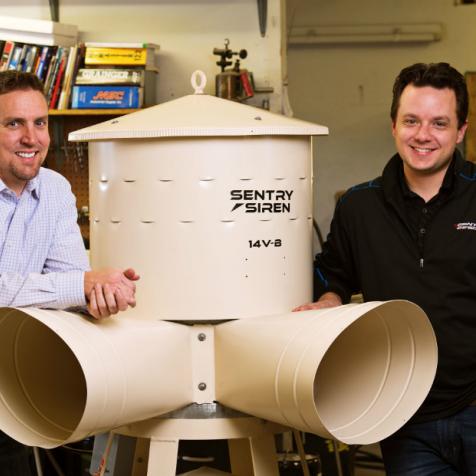
Sentry Siren
By Eric Peterson | Mar 27, 2018
Company Details
Location
Cañon City, Colorado
Founded
1905
Ownership Type
Private
Employees
14
Products
Warning sirens
Cañon City, Colorado
Employees: 14
Privately owned
Founded: 1905
Industry: Electronics & Aerospace; Built Environment; Contract Manufacturing
Products: Warning sirens
COO Scott Yarberry is pushing the stalwart siren manufacturer into new markets with both time-tested and innovative technologies.
A little more than a century ago, a company started manufacturing warning sirens in Rochester, New York. Its Model M sirens became the industry standard, built to last a century.
In 1972, the Yarberry family bought the business, then known as Sterling Siren and under fiscal duress, and moved it to Cañon City with a new moniker: Sentry Siren. The stalwart manufacturer came back strong in Colorado, and continues to grow with new products and markets today.
William Yarberry is the semi-retired CEO; his son, Scott Yarberry, now runs day-to-day operations. "Dad was a one-man band initially," says Scott, describing a garage-based manufacturing operation that worked with contract manufacturers.
William's F-2 utility siren soon found a solid foothold in the municipal and industrial markets. "By the early '80s, he landed contracts with nuclear power plants," says Scott. "That was the catalyst throughout the 1990s."

Scott joined the company in 1999 and pushed into new markets. "I hit the road and started building the sales force," he says. By 2005, Sentry Siren expanded into software and detection technology to complement its sirens.
The primary markets are municipalities and industrial users. "We do really well with small town USA," says Scott, noting that Sentry has installations in more than 500 towns with less than 1,000 residents.
"We have tens of thousands of installations around the world," he adds. "We have more customers than we can count."
The municipal market accounts for about 60 percent of sales. That's down from about 80 percent. "We've worked hard to even that out more," says Scott. Schools have emerged as a sales driver, as has the private sector in general.

Scott says Sentry's big differentiator is its focus on custom systems. Competitors "tell the customers to pick between A, B, and C -- that's not how we like to do things," he says. "We like to design siren systems around their needs."
Sentry's catalog features 30 stock siren models ranging from $100 to $30,000, whereas competitors typically offer less than five.
Quality is another differentiator, Scott adds. "We don't do things on the cheap," he explains. "We try to make every unit better than the last."
The proof is in the longevity of Sentry's products. Citing premium parts like continuous-duty motors and sealed bearings and a five-year factory warranty, Scott points to one of the company's oldest operating installations in a clocktower in Maryland. "It was put into service in 1928," he says. "We have products that do not fail."

That kind of durability leads to great word of mouth. "We have a good reputation and a sold brand name, and we worked very, very hard for it," says Scott.
The company has long focused on mechanical, as opposed to electronic, sirens. "Technology has found the best answer to producing sounds, and that's mechanically," says Scott. Sentry's sirens can produce a stronger sound than electronic counterparts. They're also omni-directional, meaning the sound goes out in all directions.
However, Sentry is working on an electronic unit "that's leaps and bounds ahead of the market in terms of intelligibility," he adds. Due out in 2018, the VR series "is near-perfect on the intelligibility scale. . . . That product is opening up a whole new marketplace for us."
That's coming on the heels of a boom era for the company. "We had a growth spurt between 2012 and 2014 that was in the triple digits," says Scott. He hopes to bring that into a consistent range of 10 to 30 percent a year, noting, "Triple-digit growth is impossible to sustain."

Challenges: "Funding," says Scott. "It's always number one." Sentry's customer base "continues to struggle with funding," he adds. "Rural America suffers. Our market is Tornado Alley -- that's our number-one area."
Sentry's customers often depend on grant funding to buy siren systems. "When grant cycles are down, our sales are down," says Scott. "It's red tape, it's bureaucracy."
"We have to go where the grants go, and that's hard," he adds, noting that Sentry often helps connect customers with sources for grant funding.
Opportunities: The aforementioned VR series. "I have giving forecasts -- I never do it," says Scott. "But I do have a good feeling about it."
He also sees room for growth in exports to South America and Asia. "We've seen a dramatic shift in both of those markets to higher quality," he says.

Needs: "I would love to see some consistency in the communication protocols from our government," says Scott. "We have so many different signals. . . . It's very discombobulating, if you will. We would love to see a consistent community platform for first responders."
"I would love to see a little more consistent funding to communities across the country," he adds. "I would love to see a little more evening out to smaller communities. It's difficult when someone has to be a fire chief and emergency manager and has to write grants, too."
